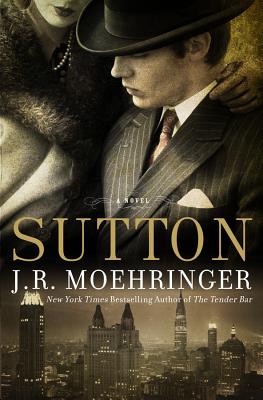"Willie 'The Actor' Sutton was a celebrity bank robber in an
era when the vast majority of Americans were poor, feeling mistreated by the
banks and their wealthy owners. And although Willie Sutton lived (and robbed
banks) mostly during the Great Depression, this is a very contemporary story.
Willie Sutton was a real man, convicted multiple times for robbing banks and
for escaping jail, he was eventually pardoned by New York’s Governor
Rockefeller and released from prison for good in 1969, mostly due to his ailing
health. And although Sutton would live until 1980, he would live in relative
obscurity.
J.R. Moehringer’s Sutton is not a biography: it is a work of fiction, based on Sutton’s own two memoirs (which often contradicted one another), among other sources. The premise of the book is an exclusive interview with a New York newspaper on Christmas Day, 1969, the day after Sutton is released from prison. Sutton, with a reporter and photographer in tow, take a chronological tour of Sutton’s life in New York City. At each stop, Sutton tells them a version of the events that occurred there. Sometimes Sutton is talking to his guides (or is he the guide?) and sometimes he’s telling the story as it occurred, back in time. This is just one of the ways this book is unlike many others I’ve read… instead of telling the story from multiple characters’ viewpoints, Moehringer’s Sutton tells it from multiple places in time, creating a living and morphing history. It’s a vastly entertaining premise and Moehringer’s prose manages to make a murder mystery out of one of the aspects of the story.
Although not really crime fiction, Sutton is for fans of the genre, as well as for those who like biographies, and those who love stories about the Great Depression. And it’s for those who may be mired down in the election news cycle. This isn’t the first time we’ve faced a struggle between the rich and poor in this nation. Sure, the last time the 1% were called the Bankers, and Robber Barons before that… but this is an age-old struggle in the United States, and Willie Sutton was an inspiration to millions in the dark days of the Depression, when he took the banks on… by robbing them. Now I don’t advocate robbing the banks, but I understand the feeling of frustration regular working folks must have had when they were unemployed and hungry and saw banks (and stores and restaurants) that catered to the wealthy… J.R. Moehringer’s Sutton is as much a novel of this time as it is a study of a very interesting and purely American character… Willie Sutton, the man who, even after his death, is still reinventing himself…."
--Joe
J.R. Moehringer’s Sutton is not a biography: it is a work of fiction, based on Sutton’s own two memoirs (which often contradicted one another), among other sources. The premise of the book is an exclusive interview with a New York newspaper on Christmas Day, 1969, the day after Sutton is released from prison. Sutton, with a reporter and photographer in tow, take a chronological tour of Sutton’s life in New York City. At each stop, Sutton tells them a version of the events that occurred there. Sometimes Sutton is talking to his guides (or is he the guide?) and sometimes he’s telling the story as it occurred, back in time. This is just one of the ways this book is unlike many others I’ve read… instead of telling the story from multiple characters’ viewpoints, Moehringer’s Sutton tells it from multiple places in time, creating a living and morphing history. It’s a vastly entertaining premise and Moehringer’s prose manages to make a murder mystery out of one of the aspects of the story.
Although not really crime fiction, Sutton is for fans of the genre, as well as for those who like biographies, and those who love stories about the Great Depression. And it’s for those who may be mired down in the election news cycle. This isn’t the first time we’ve faced a struggle between the rich and poor in this nation. Sure, the last time the 1% were called the Bankers, and Robber Barons before that… but this is an age-old struggle in the United States, and Willie Sutton was an inspiration to millions in the dark days of the Depression, when he took the banks on… by robbing them. Now I don’t advocate robbing the banks, but I understand the feeling of frustration regular working folks must have had when they were unemployed and hungry and saw banks (and stores and restaurants) that catered to the wealthy… J.R. Moehringer’s Sutton is as much a novel of this time as it is a study of a very interesting and purely American character… Willie Sutton, the man who, even after his death, is still reinventing himself…."
--Joe


No comments:
Post a Comment